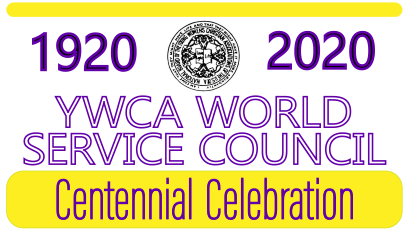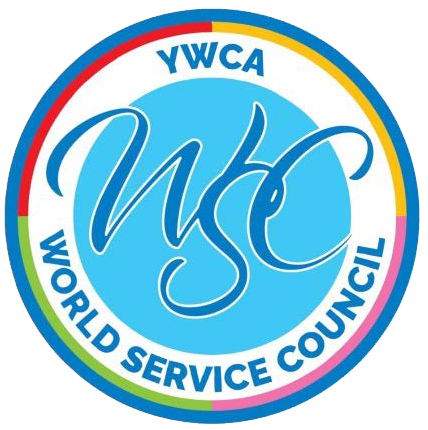
In 1942, the World Service Council (WSC) acknowledged its 25th year by including in the minutes of its annual meeting how the WSC got its name. It was explained by a Mrs. Lapham that at the close of the first World War, inspired leader Mrs. Morris “felt that the interest of the War Work Council should be continued in some enduring way. The name World Service Council came to her in a dream, and those who heard Mrs. Morris speak the next day can never forget it – everyone who heard her wanted to become a member of the World Service Council.”
This year the YWCA World Service Council is celebrating its centennial year of service as the philanthropic link between the YWCA USA and the World YWCA. Due to the many unknowns about the rest of this year and how long the pandemic safety protocols will continue around the world, the WSC has postponed an in-person meeting this year. As a prelude to a celebratory event in 2021, the World Service Council will provide an exciting virtual platform October 15 for WSC and YWCA members and the public to hear facts and stories, including member interviews, and a historic video focused on WSC’s significance over a century.
When the YWCA USA became a force for educating and training women during the Industrial Revolution, it was already world focused and joined with three other countries (Great Britain, Sweden and Norway) to form the World YWCA in 1894. Its early work, spanning two World Wars, is one of the greatest stories of NGO international activism with far reaching results. Its history on the world stage has been impressive and impactful.
Tapped by President Woodrow Wilson and in response to appeals for help from war torn YWCAs in Europe, the YWCA USA formed a War Council Overseas Committee and a Foreign Division that sent Secretaries abroad to help with reconstruction efforts after World War I and to welcome YWCA women from other countries to train in the USA. Coinciding with what the national office was doing, from 1917 to 1920, socially conscious women of influence like Mrs. Stewart Cushman and Mrs. John Rockefeller raised large sums of money for restoring YWCAs in the aftermath of the First World War. The Rockefeller family further showed its commitment by providing an endowment to the YWCA USA for education and travel opportunities to other countries to help with building capacity and work on mutual initiatives.
In 1920, there was a consolidation of the Foreign Dept. and Overseas Committee. A resolution presented by the War Work Council Overseas Committee Oct. 11, 1920, read: “That the Overseas Committee appeals to the returning YWCA secretaries to continue their war service in this country by becoming interested in…activities of the YWCA such as personal interest and responsibility for a foreign student or in some immigration work.”
The WSC, first chaired by Vera Cushman, worked with the national office staff to meet the needs of the World YWCA. In a statement to the National Board she said, “We are the greatest and strongest of women ever formed – I mean of women, by women and for women. We ought to be watchers of the skies with the widest vision, the deepest sympathy, the most sensitive outreach, the longest look ahead and the most limitless courage. We ought to be inclusive, inspiring, prophetic.”
During its 100-year history, the WSC has worked with the World YWCA and the International Building Fund to provide capital funds to YWCAs in more than 70 countries. The WSC has also actively helped finance yearly educational programs around the world especially those focused on the training of young women for service and leadership. Supporting the World YWCA internship program, that was reinstituted as a yearly endeavor in 1991, has been a major fundraising priority. Muna Killingback from Massachusetts was one of the first one-year interns. “Calling it a turning point in her life,” Muna represented the YWCA at the UN NGO meetings and, though fearful, was told the “YWCA believes in baptism by fire.” The year- long interns help implement the movement’s strategic priorities, support international training events, and represent the World YWCA at key international advocacy platforms. In 2000, short term advocacy internships were initiated to enhance skills and knowledge on advocacy and activism through training and exposure to the work and mechanisms of the UN system.
Funds from the WSC have also gone to the revitalization and creation of YWCAs in developing areas of the world, such as in several countries of the former Soviet Union. Also, over the past 20 years the WSC has provided the World YWCA with financial support to respond quickly to emergencies in areas where YWCAs have been affected by natural disasters or conflict. Such funds have been used in the Philippines, Haiti, the Sudan, Zimbabwe, and most recently in Nepal to name just a few.
Another major focus of the WSC is its long -term involvement with the UN dating back to the 1940s. Several of its leaders have been registered World YWCA representatives at the United Nations for decades where they continue the YWCA’s role as a leading NGO, and have supported the UN, UNICEF, and CSW on women’s issues. YWCA leaders such as Mildred Persinger, Nita Barrow of Barbados and Elizabeth Palmer played major roles in initiating three UN World Conferences for women in 1975, ‘85, and ‘95. These three conferences drew thousands of attendees and helped show the need for support of women’s work, which in turn led to the scheduling of annual sessions of the Commission on the Status of Women at the UN in New York.
Many World Service Council members have played significant volunteer roles in the history of the movement. In fact, more than a third are former national board members or former national staff. Thus, WSC helps keep former YWCA members engaged and provides a way for them to express their loyalty to the YWCA movement. Currently, the WSC is a Council of the National YWCA’s Global Relations Committee. The collaboration has helped to strengthen the international work by building more awareness and identifying potential additional funds for the global movement. Current members seek to increase the number of members, friends and interested contributors who support the work of the YWCA USA and the World YWCA. The vision is: Investing in women is investing in development. Investing in development is investing in peace.
In addition, to raising funds as a first priority, the WSC provides in-person meeting opportunities including hosting an annual luncheon business meeting and seminar once a year with distinguished speakers. It assists YWCA USA with a welcome reception for World YWCA delegates attending the UN’s Commission on the Status of Women sessions held in March. Members participate in YWCA meetings, seminars and leadership events, attend relevant national and international conferences and workshops and provide hospitality to visiting World YWCA leaders and dignitaries.
Joyce Mims who has been one of the longest serving chairs of the WSC (1989-2011) has reflected on WSC meetings as a time for reaffirming the YWCA as “a place where women’s voices are respected and heard; a place where truths can be told about violence and anti-neighborliness; and a place where imagination is nurtured to challenge hate with hope and positive change. She quotes a Tibetan saying: “Wherever you have friends, that is your country, and wherever you receive love, that is your home.” For thousands of women around the world, that place is the YWCA, which our generosity makes possible.”
